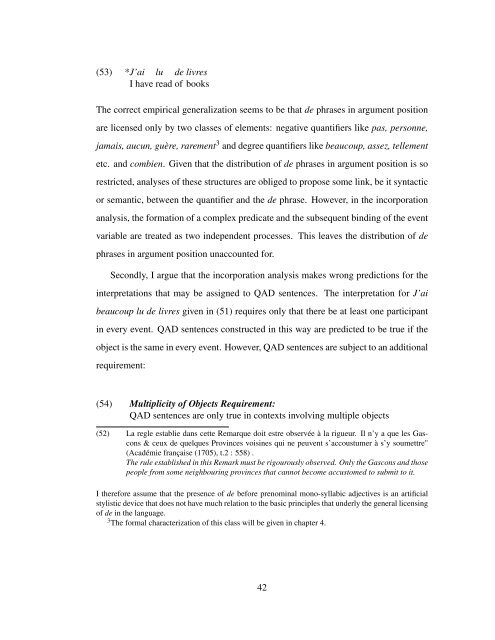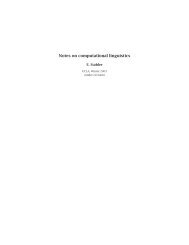Formal Approaches to Semantic Microvariation: Adverbial ...
Formal Approaches to Semantic Microvariation: Adverbial ...
Formal Approaches to Semantic Microvariation: Adverbial ...
Create successful ePaper yourself
Turn your PDF publications into a flip-book with our unique Google optimized e-Paper software.
(53) *J’ai lu de livres<br />
I have read of books<br />
The correct empirical generalization seems <strong>to</strong> be that de phrases in argument position<br />
are licensed only by two classes of elements: negative quantifiers like pas, personne,<br />
jamais, aucun, guère, rarement 3 and degree quantifiers like beaucoup, assez, tellement<br />
etc. and combien. Given that the distribution of de phrases in argument position is so<br />
restricted, analyses of these structures are obliged <strong>to</strong> propose some link, be it syntactic<br />
or semantic, between the quantifier and the de phrase. However, in the incorporation<br />
analysis, the formation of a complex predicate and the subsequent binding of the event<br />
variable are treated as two independent processes. This leaves the distribution of de<br />
phrases in argument position unaccounted for.<br />
Secondly, I argue that the incorporation analysis makes wrong predictions for the<br />
interpretations that may be assigned <strong>to</strong> QAD sentences. The interpretation for J’ai<br />
beaucoup lu de livres given in (51) requires only that there be at least one participant<br />
in every event. QAD sentences constructed in this way are predicted <strong>to</strong> be true if the<br />
object is the same in every event. However, QAD sentences are subject <strong>to</strong> an additional<br />
requirement:<br />
(54) Multiplicity of Objects Requirement:<br />
QAD sentences are only true in contexts involving multiple objects<br />
(52) La regle establie dans cette Remarque doit estre observée à la rigueur. Il n’y a que les Gascons<br />
& ceux de quelques Provinces voisines qui ne peuvent s’accoustumer à s’y soumettre"<br />
(Académie française (1705), t.2 : 558) .<br />
The rule established in this Remark must be rigourously observed. Only the Gascons and those<br />
people from some neighbouring provinces that cannot become accus<strong>to</strong>med <strong>to</strong> submit <strong>to</strong> it.<br />
I therefore assume that the presence of de before prenominal mono-syllabic adjectives is an artificial<br />
stylistic device that does not have much relation <strong>to</strong> the basic principles that underly the general licensing<br />
of de in the language.<br />
3 The formal characterization of this class will be given in chapter 4.<br />
42
















